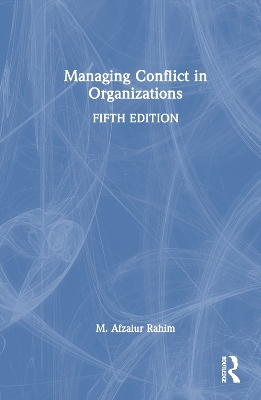
Managing Conflict in Organizations
Routledge (Verlag)
978-1-032-25959-8 (ISBN)
This book is a vigorous analysis of the rational application of conflict theory in organizations for organizational behavior students, as well as practitioners looking to practice constructive conflict management in their work. This fifth edition has been thoroughly updated to reflect the latest research in the field and explains the effect that research has on practice, with an expanded range of practical examples and cases.
It covers emergent topics such as:
Differentials in conflict management styles across generations
Technology and its effect on conflict style changes
Cross-cultural studies and diversity
This text is a valuable resource for students, instructors, and researchers in human resource management and organizational behavior, and a practical handbook for practitioners that manage (or manage upward) their colleagues.
M. Afzalur Rahim (Ph.D., University of Pittsburgh) is a University Distinguished Professor of Management, emeritus, and Hays Watkins Research Fellow, Western Kentucky University. He is also the Founding Editor of Applied Management Journal (formerly Current Topics in Management) and is the founder of the International Journal of Organizational Analysis, International Journal of Conflict Management, International Association for Conflict Management, International Association for Applied Management (formerly International Conference on Advances in Management), and Bangladesh Academy of Business Administration. Dr. Rahim has 25 edited books and five for which he is the sole author. He has published 75 journal articles, 53 book chapters, and presented over 100 papers at various conferences. The published works involve 70 different coauthors. He has also produced onemanuals and 16 measurement instruments. In the organizational sciences Dr. Rahim has over 16,900 Google citations. His articles were published, among others, in the Academy of Management Journal, Intelligence, Journal of Applied Psychology, Journal of Management, and Multivariate Behavioral Research. His current research interests are in the areas of cross-cultural conflict management, leaders’ emotional, cultural, and social intelligence.
Foreword
Preface
1 Social Conflict Construct
Contributions from Various Disciplines
Organizational Conflict
2 Nature of Conflict
Defining Conflict
Threshold and Grey-Zone Conflicts
Conflict and Competition
Classifying Conflict
Styles of Handling Interpersonal Conflict
3 Organizational Learning and Effectiveness
Nature of Organizational Learning
Types of Learning
Nature of Organizational Effectiveness
Characteristics of the Old Paradigm
Problem Solving
Conflict Management in the New Paradigm
4 Conflict-Management Design
Nature of Conflict Management
Contingency Approach
Conflict Management Process
5 Intrapersonal Conflict
Types of Intrapersonal Conflict
Role
Role Conflict
Role Ambiguity
A Model of Role Conflict and Ambiguity
Consequences of Role Conflict
Managing Intrapersonal Conflict
6 Interpersonal Conflict
Prisoner's Dilemma
A Model of Conflict
Consequences of Interpersonal Conflict
Negotiation
Managing Interpersonal Conflict
Conflict- Management Styles in a Global Setting
7 Intragroup Conflict
Types of Groups
Effects of Intragroup Conflict
Managing Intragroup Conflict
8 Intergroup Conflict
Dynamics of Intergroup Conflict
Effects of Intergroup Conflict
Managing Intergroup Conflict
Intervention
9 Ethics and Morality
Ethics and Morality Defined
Behavioral Perspectives for Conflict Management
Ethical Evaluation of Conflict Management
Ethics and Leadership Structure
Four Methods of Discourse
General Appropriateness of the Methods
Practical Methods and Conflict Management Styles
Stages of Moral Development
Empirical Study on Stages and Styles
10 The Measurement of Conflict
Development of the ROCI– I
Development of the ROCI– II
Sample Items of the ROCI– I and ROCI– II
New Measurements Scales that are being Developed
11 Epilogue
A Design for Managing Conflict
Appendix A: Cases
Case 1: Allen Manufacturing Corporation
Case 2: New Employee at the Credit Union
Case 3: Minnis Service
Case 4: The Hormel Strike at Austin, Minnesota
Appendix B: Exercises
Exercise 1: Contract Building
Exercise 2: Technique of Role Analysis
Exercise 3: Job Design
Exercise 4: Transactional Analysis
Exercise 5: Managing Interpersonal Conflict
Exercise 6: Team Building
Exercise 7: Intergroup Problem Solving
Exercise 8: Organizational Mirroring
Exercise 9: Analysis of Task Interdependence
References
Author Index
Subject Index
| Erscheinungsdatum | 11.07.2023 |
|---|---|
| Zusatzinfo | 43 Tables, black and white; 15 Line drawings, black and white; 15 Illustrations, black and white |
| Verlagsort | London |
| Sprache | englisch |
| Maße | 156 x 234 mm |
| Gewicht | 789 g |
| Themenwelt | Sozialwissenschaften ► Kommunikation / Medien ► Kommunikationswissenschaft |
| Wirtschaft ► Betriebswirtschaft / Management ► Personalwesen | |
| Wirtschaft ► Betriebswirtschaft / Management ► Planung / Organisation | |
| Wirtschaft ► Volkswirtschaftslehre | |
| ISBN-10 | 1-032-25959-0 / 1032259590 |
| ISBN-13 | 978-1-032-25959-8 / 9781032259598 |
| Zustand | Neuware |
| Informationen gemäß Produktsicherheitsverordnung (GPSR) | |
| Haben Sie eine Frage zum Produkt? |
aus dem Bereich


